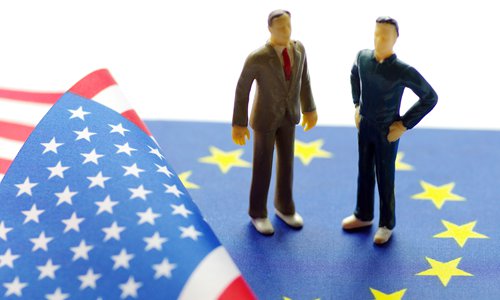HOME >> OPINION
Amid US hubris, Europe should raise its guard
By He Zhigao Source:Global Times Published: 2019/7/15 18:53:42

Photo: IC
Fresh verbal duels between the US and European countries, including the UK, France, and Germany, have called attention to transatlantic relations. However, it is unlikely that the diplomatic squabble will worsen into a nasty conflict.
After trade disputes resumed in April, Europe-US relations again faced new challenges with the White House proposing additional tariffs on EU goods in July.
Amid the European clamor, Berlin-Washington ties are getting worse. A poll published by German public broadcaster ARD in 2017 suggested that respondents trusted Russia (28 percent) more than the US (25 percent). The Pew Research Center's survey in March 2019 shows that only 41 percent Germans want more cooperation with the US while 69 percent would like to work with Russia.
In addition, the sudden resignation of Kim Darroch as UK ambassador to the US has relations between Washington and London in a bind, leading to more uncertainties.
In terms of France-US relations, Washington initiated an investigation under Section 301 into France's Digital Services Tax. Paris-Washington conflicts on several global issues may further intensify Europe-US frictions over trade and in other domains. The distance between the US and major European powers seems to be increasing.
Intense economic rivalry between the US and Europe is of major political, strategic and geopolitical significance. Trade spats between them may not only impact future transatlantic relations, but also affect US ties with individual EU members and other countries.
Washington's relations with Berlin and Paris have already hit an impasse. Its ties with London also seem to have run into a bottleneck. The "America First" policy has shaken the international order and hurt the international trading system. However, that does not stop the US from using the "big stick" trade policy against any trading partner.
The US has been in favor of Brexit and a better trading partnership with the UK. In particular, it hopes to influence the UK's post-Brexit economic and trade strategies. By exploiting London's desire to reintegrate into the world trade system, Washington is forcing London to make concessions in trade and services. After all, UK's leverage would decline significantly if it were to leave the European Single Market.
Hence, in bilateral trade negotiations, the Trump administration has supported London's withdrawal from the European Single Market and the EU Customs Union, expecting the UK will accept the US regulatory framework. Nonetheless, Darroch's resignation has cast a shadow over post-Brexit UK-US cooperation in trade and information sharing.
The US has also kept up pressure on major EU member states including France and Germany, attempting to take the initiative in trade disputes. Trade cooperation has been one of the main levers of EU foreign policy. According to data in 2017, one-seventh of EU employment was supported by exports, and the total import and export of goods and services exceeded 5.4 trillion euros ($6.1 trillion).
The EU has been aware that trade disputes will result in losses to both sides, but it has no alternative but to respond to the US "big stick."
Trade frictions between the US and major EU member states are very likely to spread to other issues, including digital technology, the Iran nuclear deal, NATO military spending, energy cooperation and climate change.
The escalating disputes won't cut off ties between the US and major European powers, but will send important signals. Increasing distance between the US and EU may further split Europe into core states and marginalized ones. Peripheral countries will choose whether to strengthen cooperation with the US, or to remain neutral, or to positively integrate into the European Single Market. EU-US tensions may also affect countries and regions that have close trade relations with the European bloc. They will have to seek a balance between the US and Europe.
On the whole, the "America First" policy has not only increased the burden on an already troubled global economic order, but also added pressure on US allies and partners. Global rules and the postwar trade order might be destroyed, and global economic governance will probably get entangled in the "law of the jungle."
To limit damage, the EU's best choice is to buttress its ability to take on the US at the bilateral level while defending the international multilateral trading system. It should also maintain open and free trade with the rest of the world.
From now on, new EU leaders and a new British prime minister will face an even more arduous task of handling relations with the US, because stable transatlantic relations are crucial for both Europe and the US. But conflicts between them cannot be solved easily. Volatility and uncertainty will permanently loom over Europe-US relations.
The author is a research fellow with the Institute of European Studies, Chinese Academy of Social Sciences. opinion@globaltimes.com.cn
Posted in: VIEWPOINT